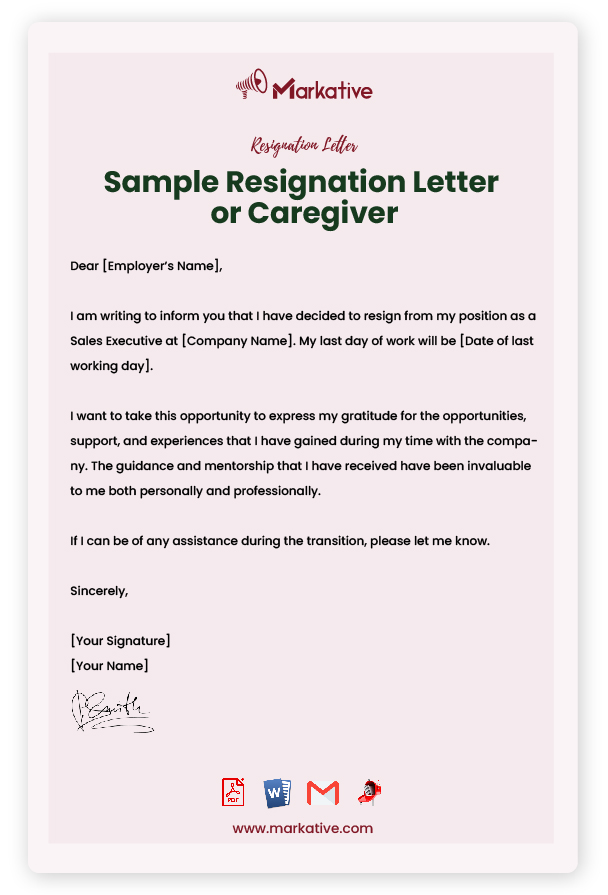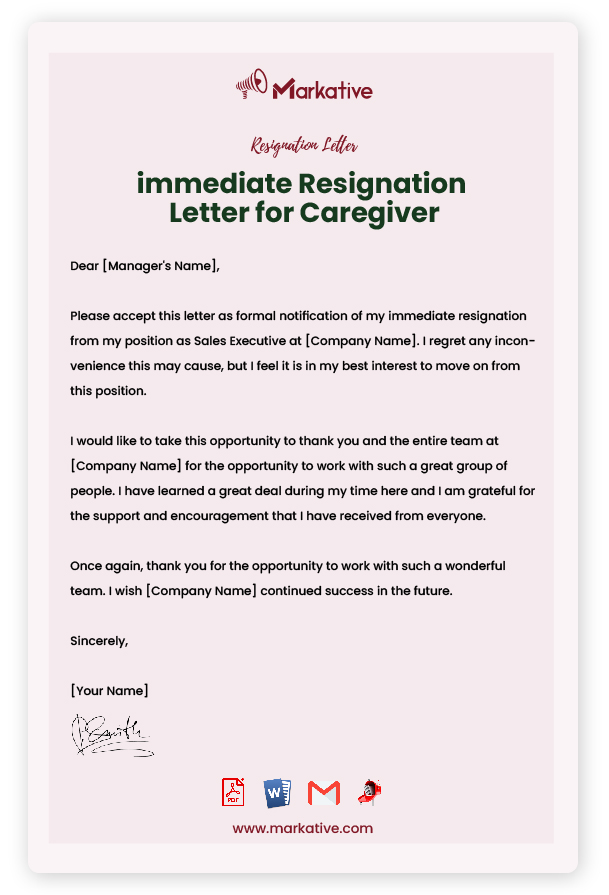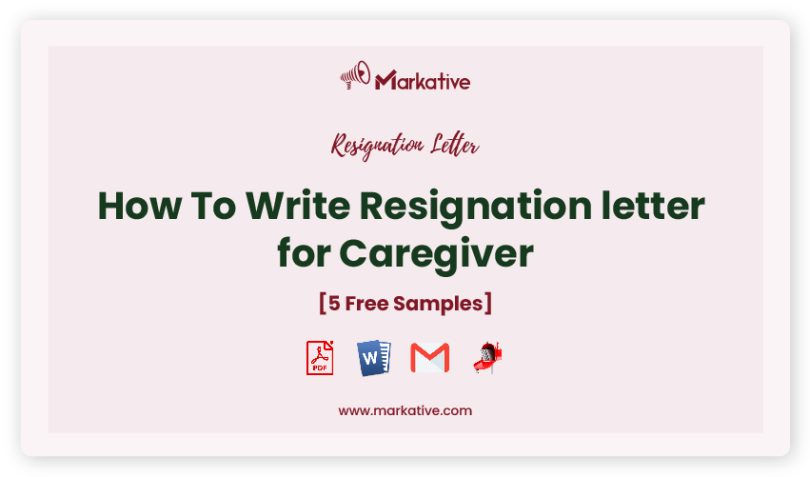As a caregiver, resigning from a job can be a tough decision. However, resigning the right way can make a significant impact on both the employer and the caregiver. A resignation letter is an essential component of the resignation process, and it’s crucial to get it right. Not only does it serve as a formal notification of the caregiver’s intention to resign, but it also outlines the reasons for leaving and provides a chance to express gratitude for the experience gained.
A well-crafted resignation letter is essential because it allows the caregiver to leave on good terms with the employer. By doing so, the caregiver can maintain a positive professional relationship, which may prove to be helpful in the future. Moreover, a good resignation letter creates a positive impact by showing the caregiver’s professionalism, responsibility, and respect towards the employer. It also reflects positively on the caregiver’s character, which can be beneficial in future job opportunities.
In this article, we’ll discuss the importance of writing a Resignation Letter for Caregiver, and how a well-crafted resignation letter can make a significant impact. We’ll also provide some tips on how to write a resignation letter that leaves a positive impression on the employer. Whether you’re resigning due to personal reasons, finding a new job, or starting a new chapter in your life, a well-written resignation letter is an essential aspect of your departure. So, let’s dive in and learn how to write a resignation letter that helps you leave your current position on a positive note.
How To Write Appealing Resignation Letter for Caregiver?
Resigning from a caregiver job can be a difficult decision, but when it’s time to move on, it’s important to write a professional and appealing resignation letter. Here are five steps to help you write an effective resignation letter.
- Start with a proper greeting: Begin your resignation letter with a professional greeting, addressing your employer by their name and using a formal tone. For example: “Dear Ms. Smith,” or “Dear Mr. Johnson,”.
- State your intention to resign: In the opening paragraph, clearly state that you are resigning from your caregiver job and the date of your last day of work. For example: “Please accept this letter as my formal resignation from my position as a caregiver, effective April 30, 2023.”
- Express gratitude: Express gratitude for the opportunity to work as a caregiver for your employer, and highlight the skills and experience you’ve gained. For example: “I am grateful for the opportunity to work as a caregiver for your family. During my time here, I’ve learned valuable skills such as compassion, patience, and excellent communication.”
- Offer to assist with transition: In the following paragraph, offer to assist with the transition by training your replacement, documenting your responsibilities, or any other assistance that would help your employer find a replacement caregiver with ease.
- End with a polite closing: Close your resignation letter with a polite statement, expressing your best wishes to your employer and the family you’ve been caring for. For example: “Thank you again for the opportunity to work as a caregiver for your family. I wish you all the best in the future.”
Conclusion: Writing an appealing resignation letter as a caregiver is a professional and polite way to resign from your job. By following these five steps and including examples, you can craft a well-written resignation letter that will leave a positive impression on your employer.

immediate Resignation Letter for Caregiver
[Your Name] [Your Address] [City, State ZIP Code] [Date] [Employer's Name] [Employer's Address] [City, State ZIP Code] Dear [Employer's Name], I am writing to inform you of my immediate resignation from my position as a caregiver, effective [Date of Resignation]. Due to personal circumstances, I am no longer able to continue my employment with [Company/Organization Name]. I would like to thank you and the [Company/Organization Name] for the opportunity to work as a caregiver. During my time with the company, I have learned a lot about providing care to individuals in need, and I have gained valuable experience that will serve me well in the future. I understand that my resignation is sudden, and I apologize for any inconvenience it may cause. I will do my best to ensure a smooth transition during this period. I am willing to provide any assistance needed to help with the transition process, including training my replacement or completing any outstanding tasks. Thank you again for the opportunity to work with your company. I wish the organization and my former colleagues all the best in their future endeavors. Sincerely, [Your Name]
Sample Resignation Letter for Caregiver
Dear [Employer’s Name], I am writing to inform you that I have decided to resign from my position as a caregiver for [Client’s Name]. I am providing two weeks’ notice so that you have sufficient time to find a replacement and to ensure a smooth transition for [Client’s Name]. I have greatly appreciated the opportunity to work with [Client’s Name] and to be a part of their care team. I have learned a lot during my time here and will always be grateful for the experience. I have accepted a new opportunity that will require me to move on to a new position, but I want to assure you that I will do everything I can to make this transition as seamless as possible. I will complete all assigned tasks before my last day of work and will provide detailed notes and instructions for the new caregiver. Thank you for your support during my time here. I wish you and [Client’s Name] all the best. Sincerely, [Your Name]
Professional Resignation Letter for Caregiver
Dear [Employer's Name], I am writing to formally submit my resignation as a caregiver, effective [Date]. I have accepted another employment opportunity that aligns with my career goals and aspirations. I am grateful for the opportunity to have worked with you and your loved ones. It has been a privilege to provide care and support to them during my time here. I appreciate the trust and confidence you have placed in me, and I will always cherish the memories and experiences gained while working with you. Please let me know how I can assist with the transition during my remaining time here. I will ensure that I complete all pending tasks and responsibilities before my departure. Additionally, I am willing to train and assist my replacement, to ensure that they are fully prepared to take over my duties. Thank you again for the opportunity to be a part of your family's life. I wish you and your loved ones the best of health and happiness. Sincerely, [Your Name]
Urgent Resignation Letter for Caregiver Sample
[Your Name] [Your Address] [City, State ZIP Code] [Email Address] [Date] [Employer’s Name] [Employer’s Address] [City, State ZIP Code] Dear [Employer’s Name], I am writing to inform you of my immediate resignation from my position as a caregiver with [Company Name]. I regret the suddenness of this decision, but due to personal circumstances, I am unable to continue in this role. I would like to express my gratitude for the opportunity to work for such a wonderful organization, and for the support and guidance provided by my colleagues and supervisors during my time here. I will make every effort to ensure a smooth transition during my remaining days on the job. I will continue to provide the highest level of care to my clients until my last day of work. Thank you for your understanding and cooperation during this difficult time. If there is anything I can do to facilitate the transition process, please do not hesitate to let me know. Sincerely, [Your Name]
Simple Resignation Letter for Caregiver
Dear [Employer's Name], I am writing to inform you of my decision to resign from my position as a caregiver, effective [Date]. I have appreciated the opportunity to work with you and your loved ones and I am grateful for the trust you have placed in me. However, due to personal reasons, I have decided to step down from my role as a caregiver. I understand the importance of providing continuity of care, and I will do everything in my power to ensure a smooth transition during my remaining time with you. Thank you for the valuable experience and knowledge I have gained during my time with you. I appreciate your understanding and support during this transition. Sincerely, [Your Name]
How Much Notice Should You Give for a Resignation Letter for Caregiver?
Statistics show that the demand for caregivers is expected to grow by 8% from 2019 to 2029, faster than the average for all occupations. Additionally, the median annual wage for personal care aides was $27,080 in May 2020. The need for caregivers is driven by an aging population and an increase in chronic illnesses such as dementia and Alzheimer’s disease.
When resigning from a caregiver position, it is essential to provide as much notice as possible to allow for a smooth transition for both the employer and the person receiving care. Generally, two weeks’ notice is the standard, but it may be necessary to provide more or less notice, depending on the individual circumstances. If possible, it is best to discuss the resignation with the employer in person and provide a written resignation letter as a formal notice of the intention to leave. It is important to be professional and respectful throughout the resignation process to maintain a positive relationship with the employer and to ensure the well-being of the person receiving care.

Is it Ok To Email a Resignation Letter for Caregiver?
It is generally acceptable to email a resignation letter for a caregiver position, as long as the employer has provided an email address for communication. However, it is important to ensure that the email is professional and includes all the necessary information, such as the reason for resignation and the last day of work. It is also recommended to follow up with a phone call or in-person conversation to confirm receipt of the resignation letter and to discuss any outstanding matters.
Example:
Dear [Employer’s Name], I am writing to inform you of my decision to resign from my position as a caregiver, effective [insert last day of work]. I have appreciated the opportunity to work with you and your family and have gained valuable experience in the field. However, I have decided to pursue other opportunities that align better with my career goals. I will ensure a smooth transition by completing all my pending tasks and providing necessary handover information to my replacement. Please let me know if there is anything else that I can do to assist during this transition period. Thank you for your understanding and support during my tenure as a caregiver. Sincerely, [Your Name]
Common Mistakes When Writing a Resignation Letter for Caregiver?
- Being too emotional: While it’s important to express gratitude and appreciation for the opportunity to work as a caregiver, it’s important to avoid being overly emotional in your resignation letter. Stick to the facts and keep the tone professional.
- Not giving enough notice: It’s important to give your employer ample notice of your resignation, especially when you work as a caregiver. A two-week notice period is standard, but you may want to give more time if possible to allow your employer to find a replacement and ensure a smooth transition.
- Not being clear about your reasons for leaving: It’s important to be clear and direct about your reasons for leaving, but without getting into unnecessary details. Keep your resignation letter concise and to the point, and avoid criticizing your employer or colleagues. Focus on the positive aspects of your experience and express gratitude for the opportunity to work as a caregiver.
Conclusion:
writing a resignation letter as a caregiver is an important step when leaving your job. It is recommended to provide ample notice, typically two weeks, to allow for a smooth transition for both the employer and the patient. When writing a resignation letter, it is important to keep it professional and positive, thanking the employer for the opportunity and highlighting the reasons for leaving. Common mistakes to avoid include being negative or emotional, failing to provide adequate notice, and neglecting to tie up loose ends.
Lastly, there are many free and ready-to-use templates available online that can help guide you through the process and ensure that you include all the necessary information. By following these tips and using a template, you can ensure that your resignation letter is effective and professional. Remember to send your letter to your employer and keep a copy for your records.







